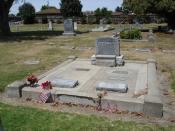Becky Liao Mrs. Bramlett
AP English Literature and Composition
Period 4
10 September 2014
Father: East of Eden essay #2
Paternal rejection is at the very heart of John Steinbeck's 1952 magnum opus, East of Eden. Steinbeck, who had faced abandonment at the hands of his own father, infused East of Eden with his memories of pain and anguish over countless years of neglect. Incidentally, many of the traumatic events from Steinbeck's childhood share parallels with the plot of East of Eden, such as how failed business ventures and crippling depression distanced both Steinbeck's father and Adam Trask from their own children. Thus, the theme of rejection remains an unrelenting presence that permeates throughout the course of East of Eden, as the Trasks face a never-ending cycle of favoritism and neglect that lives on from generation to generation.
The struggle for paternal affection in the Trask family first begins with Charles and Aron, and their father Cyrus.
Charles spends nearly the entirety of his adolescence in East of Eden trying to win his father's love, only to have Cyrus consistently favor Adam over him. Even after Charles overworks himself to afford a decent gift for his father's birthday, Cyrus still prefers Adam's practically effortless gift of a stray pup over Charles' expensive German knife, which he hardly even acknowledges. Without even having to try, Adam Trask has been, and will always be, loved more by his father than his brother has, as Cyrus confirms that "I [Cyrus] love you [Adam] better. I always have. This may be a bad thing to tell you, but it's true. I love you better" (Steinbeck, p. 61). The frustrations that arise from Cyrus' constant rejection of Charles' love eventually manifests into unspeakable rage and brutality. After Charles comes to a...


